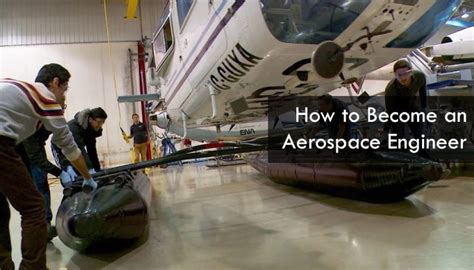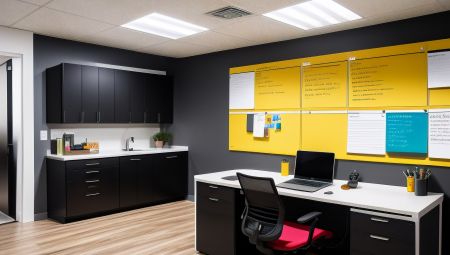Are you fascinated by the mysteries of space and the thrill of flight? Do you dream of being at the forefront of technological advancements and innovation? If so, a career in aerospace engineering might be the perfect path for you. In this blog post, we will take a deep dive into the world of aerospace engineering, exploring the roles and responsibilities of aerospace engineers, the process of pursuing a degree in this field, and the essential skills needed to succeed. We will also discuss the opportunities for internships and hands-on experiences, the importance of teamwork in aerospace engineering projects, and the ever-evolving industry trends and advancements. Whether you are a student considering a future in aerospace engineering or a professional looking to make a career shift, this post will provide valuable insights into the exciting and promising field of aerospace engineering. Get ready to lift off to new horizons and embark on an exhilarating journey towards becoming an aerospace engineer.
Table of Contents
Understanding the Role of an Aerospace Engineer
Aerospace engineering is a field that involves the design, development, and testing of aircraft, spacecraft, and missiles. As an aerospace engineer, your role is to contribute to the development of various aerospace technologies, from commercial airplanes to space exploration vehicles. You will need to have a deep understanding of aerodynamics, propulsion systems, materials science, and structural analysis in order to be successful in this field.
One of the key tasks of an aerospace engineer is to design and test prototypes for new aircraft and spacecraft. This involves using advanced computer-aided design (CAD) software to create detailed schematics, as well as conducting extensive simulations and performance tests to ensure that the design meets the necessary safety and performance standards.
Another important aspect of the role is to oversee the manufacturing and assembly process of aerospace vehicles. This involves collaborating with other engineers and technicians to ensure that the final product meets all the required specifications, and to troubleshoot any issues that may arise during the production process.
Overall, the role of an aerospace engineer is crucial to the advancement of aerospace technology, and plays a key part in shaping the future of air and space travel. It requires a combination of technical expertise, problem-solving skills, and a passion for pushing the boundaries of what is possible in the field of aerospace engineering.
Exploring the Field of Aerospace Engineering
Have you ever looked up at the sky and wondered about the amazing feats of engineering that enable humans to travel through the air and into space? The field of Aerospace Engineering is a fascinating and complex area of study that explores the design, development, and testing of aircraft, spacecraft, and related systems. It is a multidisciplinary field that involves elements of mechanical and electrical engineering, as well as materials science and aerodynamics.
Those who are interested in Aerospace Engineering often have a passion for flight and a desire to push the boundaries of what is possible in the skies and beyond. Whether it’s developing more fuel-efficient aircraft, creating innovative propulsion systems, or designing new space exploration vehicles, the work of aerospace engineers has a profound impact on the way we travel and explore the universe.
Students pursuing a degree in Aerospace Engineering will have the opportunity to delve into a wide range of topics, including aerodynamics, flight mechanics, control systems, propulsion, and aerospace structures. They will also have the chance to work on hands-on projects and collaborate with industry professionals to gain real-world experience in the field.
As technology continues to advance, the field of Aerospace Engineering is constantly evolving, presenting new challenges and opportunities for those who are passionate about exploring the frontiers of flight and space. Whether you are interested in aircraft design, space exploration, or unmanned aerial vehicles, there is a wealth of exciting possibilities to explore within the field of aerospace engineering.
Pursuing a Degree in Aerospace Engineering
Embarking on the journey of pursuing a degree in aerospace engineering can be an exciting and challenging endeavor. This field of study delves deep into the design, development, and testing of aircraft, spacecraft, and missiles, making it a crucial component of the aerospace industry. As a student pursuing this degree, you will have the opportunity to gain a comprehensive understanding of aerodynamics, propulsion, avionics, and other key aspects of aerospace engineering.
One of the primary reasons to consider pursuing a degree in aerospace engineering is the sheer potential for innovation and exploration. The aerospace industry is constantly evolving, and by obtaining a degree in this field, you will be at the forefront of cutting-edge technology and advancements. From the development of next-generation aircraft to space exploration missions, the opportunities for growth and contribution are boundless.
Moreover, pursuing a degree in aerospace engineering can open doors to a diverse range of career opportunities. Whether it’s working for a major aerospace company, joining a research institution, or contributing to governmental aerospace initiatives, the skills and knowledge gained through this degree can lead to a fulfilling and impactful career.
Finally, pursuing a degree in aerospace engineering will require dedication, perseverance, and a strong foundation in mathematics, physics, and engineering principles. It’s a field that demands attention to detail, analytical thinking, and problem-solving skills, but the rewards of contributing to groundbreaking aerospace projects and advancements make the pursuit of this degree incredibly gratifying.
Gaining Essential Skills for Aerospace Engineering
When pursuing a career in Aerospace Engineering, it is crucial to acquire the essential skills that will set you up for success in this field. These skills are not only important for excelling in academics but also for thriving in a professional setting.
One of the fundamental skills that aspiring aerospace engineers should focus on is critical thinking. This involves the ability to analyze complex problems, think logically, and make informed decisions. Aerospace engineering often involves tackling intricate challenges, and a strong foundation in critical thinking can be invaluable.
In addition to critical thinking, mathematical proficiency is another skill that is indispensable for aerospace engineers. The ability to apply advanced mathematical concepts to solve problems related to aerodynamics, propulsion, and materials is essential in this field.
Furthermore, communication skills are paramount for aerospace engineers. This includes the ability to effectively convey technical information, collaborate with team members, and present findings to clients or superiors. As aerospace engineering projects often require teamwork and collaboration, strong communication skills are vital.
Internships and Hands-On Experiences as an Aerospace Engineer
Internships and hands-on experiences play a crucial role in the education and training of aspiring aerospace engineers. These opportunities offer students the chance to apply their theoretical knowledge to real-world projects and gain invaluable practical skills that will benefit them in their future careers.
During internships, students have the chance to work alongside experienced aerospace engineers and gain insight into the day-to-day responsibilities of the profession. This hands-on experience allows them to develop a deeper understanding of the industry and build a network of professional contacts that can be invaluable when seeking full-time employment after graduation.
In addition to internships, hands-on experiences such as research projects, design competitions, and laboratory work are essential for developing essential skills in areas such as problem-solving, critical thinking, and project management. These experiences provide students with the opportunity to work on real aerospace engineering projects, collaborate with their peers, and gain a better understanding of the practical applications of their studies.
Overall, internships and hands-on experiences are an essential component of the education and training of aerospace engineers, providing them with the practical skills and industry insight needed to succeed in their careers.
Working in Collaboration: Team Dynamics in Aerospace Engineering
When it comes to aerospace engineering, teamwork is essential. An aerospace engineer rarely works alone and must be comfortable collaborating with others to achieve their goals. Team dynamics in aerospace engineering involve a variety of roles, including design engineers, test engineers, project managers, and more. Each team member brings their unique expertise to the table, and effective collaboration is crucial to the success of any aerospace engineering project.
Strong communication skills are vital for aerospace engineers as they work in collaboration with other team members. Clear and effective communication ensures that everyone is on the same page and understands their role and responsibilities. This is especially important in the fast-paced and high-stakes world of aerospace engineering, where any miscommunication can have serious consequences.
Another important aspect of team dynamics in aerospace engineering is the ability to work cohesively towards a common goal. Each team member must be able to set aside their personal agenda and work towards the overall success of the project. This requires a high level of professionalism, mutual respect, and a strong work ethic.
Overall, working in collaboration in the field of aerospace engineering requires a diverse set of skills, including communication, teamwork, and professionalism. By embracing these team dynamics, aerospace engineers can work together effectively to innovate and create groundbreaking advancements in the field.
Overcoming Challenges in Aerospace Engineering Projects
As an aerospace engineer, overcoming challenges in projects is a crucial part of the job. Whether it’s designing a new aircraft, improving propulsion systems, or developing advanced technologies, aerospace engineering projects are complex and often present unique obstacles that must be addressed.
One of the major challenges in aerospace engineering projects is managing strict regulatory requirements. Aerospace engineers must ensure that their designs and developments comply with stringent safety and quality standards set by regulatory bodies such as the Federal Aviation Administration (FAA) and the European Aviation Safety Agency (EASA).
Additionally, balancing weight constraints is another significant challenge. Aerospace engineers need to design aircraft and spacecraft that are lightweight yet durable, efficient, and capable of withstanding extreme conditions. Finding the optimal balance between weight and performance is a constant hurdle in aerospace engineering projects.
Moreover, integrating new technologies into existing aerospace systems poses its own set of challenges. Whether it’s incorporating artificial intelligence, advanced materials, or innovative propulsion systems, aerospace engineers must navigate the complexities of integrating cutting-edge technologies while ensuring compatibility and reliability.
Innovation and Advancements in Aerospace Engineering
Aerospace engineering is a constantly evolving field that requires a forward-thinking approach to problem-solving and innovation. With the rapid advancements in technology and the increasing demand for more sustainable and efficient aircraft, aerospace engineers are at the forefront of groundbreaking developments.
One of the key areas of innovation in aerospace engineering is the development of advanced materials. Strong, lightweight materials such as carbon fiber composites and titanium alloys are revolutionizing the design and construction of aircraft, making them more fuel-efficient and environmentally friendly.
Another area of advancement in aerospace engineering is in the realm of autonomous and unmanned aircraft systems. These technologies are driving the development of new and innovative aircraft designs, as well as revolutionizing the way aircraft are operated and maintained.
Furthermore, the integration of advanced propulsion systems, such as electric and hybrid-electric propulsion, is paving the way for more sustainable and eco-friendly aircraft. These advancements are not only reducing the environmental impact of air travel but also opening up new possibilities for the future of aerospace engineering.
Aerospace Engineering Career Paths and Specializations
When pursuing a career in aerospace engineering, there are a variety of paths and specializations that one can choose from. Aerospace engineers have the opportunity to work in a wide range of industries, including aviation, defense, and space exploration. Each industry offers unique career paths and specializations, allowing individuals to tailor their careers to their specific interests and goals.
One common career path for aerospace engineers is to work in the aviation industry. Within the aviation industry, engineers can specialize in areas such as aircraft design, propulsion systems, avionics, and materials and structures. These specializations allow engineers to focus on specific aspects of aircraft development and maintenance, contributing to the advancement of aviation technology.
For those interested in defense, aerospace engineering offers opportunities to work on projects related to military aircraft, missiles, and defense systems. Specializations in this field often involve working with advanced technology and innovative systems to ensure national security and defense capabilities.
Another exciting career path for aerospace engineers is in the field of space exploration. Engineers can specialize in spacecraft design, satellite systems, mission planning, and space propulsion. This specialization allows individuals to contribute to the development of spacecraft and technologies that enable space exploration and research.
The Future of Aerospace Engineering: Opportunities and Trends
Aerospace engineering is a field that is constantly evolving and advancing, with new opportunities and trends emerging all the time. The future of aerospace engineering holds immense potential for growth and innovation, opening up a wide range of opportunities for professionals in the field.
As technology continues to progress at a rapid pace, the aerospace industry is expected to see significant advancements in areas such as supersonic travel, space exploration, and unmanned aerial vehicles. These developments will create exciting opportunities for aerospace engineers to contribute to cutting-edge projects and shape the future of air and space travel.
Another key trend in the future of aerospace engineering is the increasing focus on sustainability and environmental impact. With growing concerns about climate change, there is a greater emphasis on developing eco-friendly aircraft and propulsion systems. This presents a unique opportunity for aerospace engineers to work on innovative solutions that promote environmental sustainability within the industry.
Furthermore, the rise of commercial space travel and the expansion of private aerospace companies are expected to create new career paths and specializations within the field. As the demand for space tourism and exploration grows, aerospace engineers will have the chance to be at the forefront of pioneering missions and contributing to the development of space technologies.





